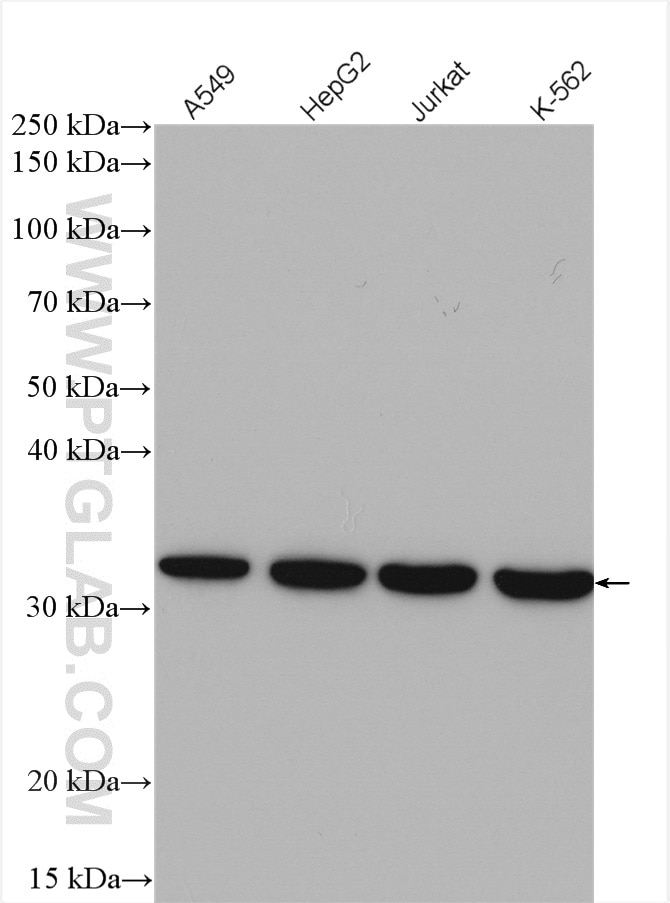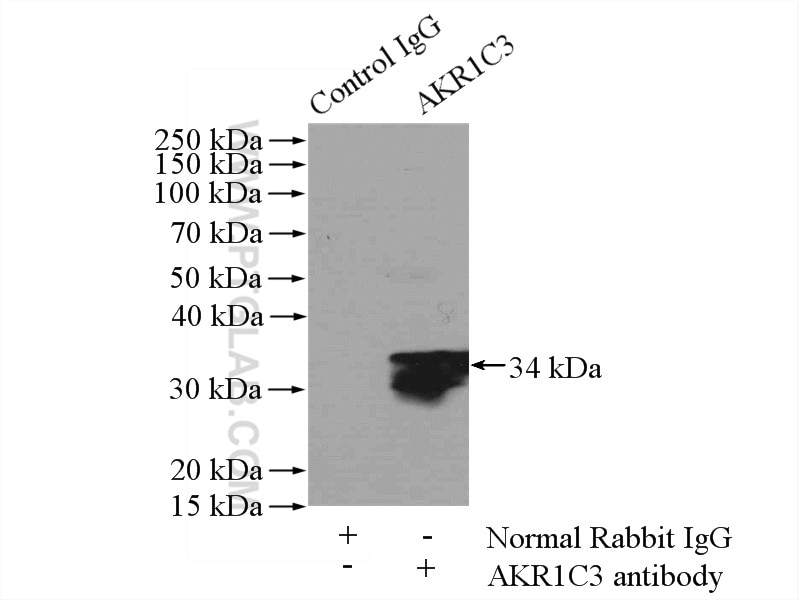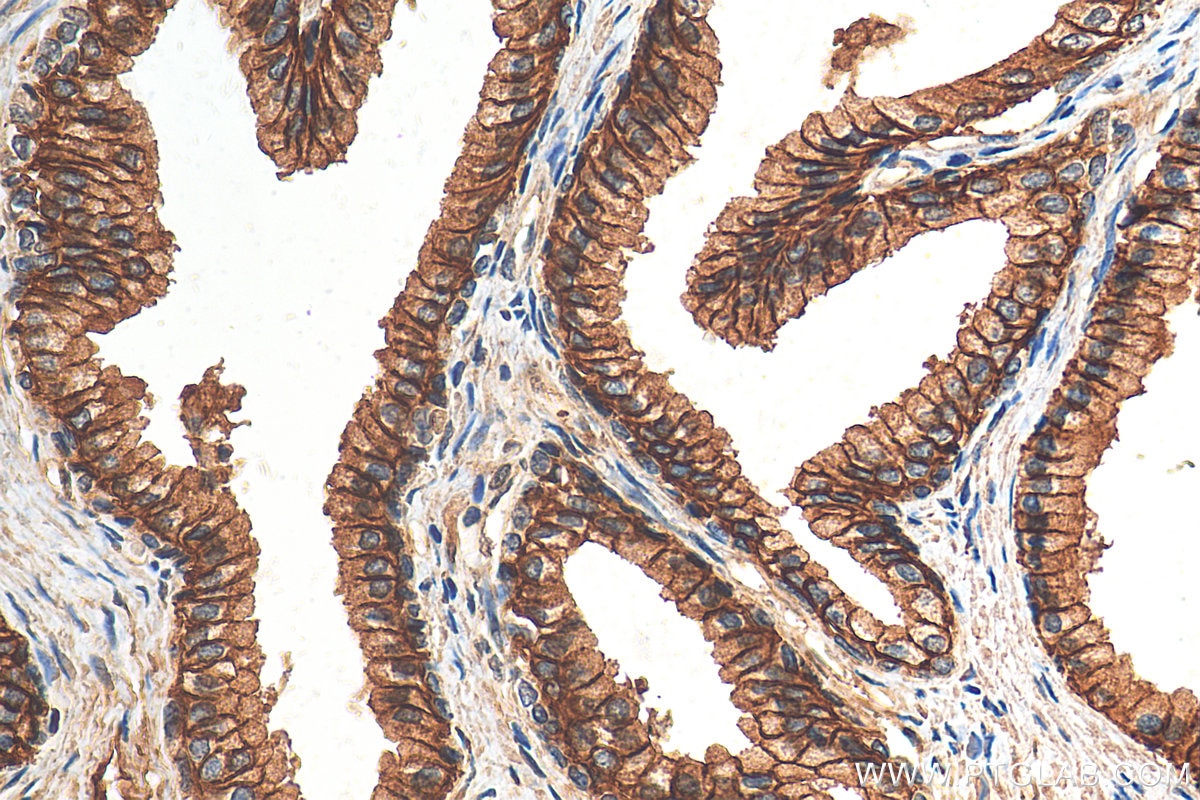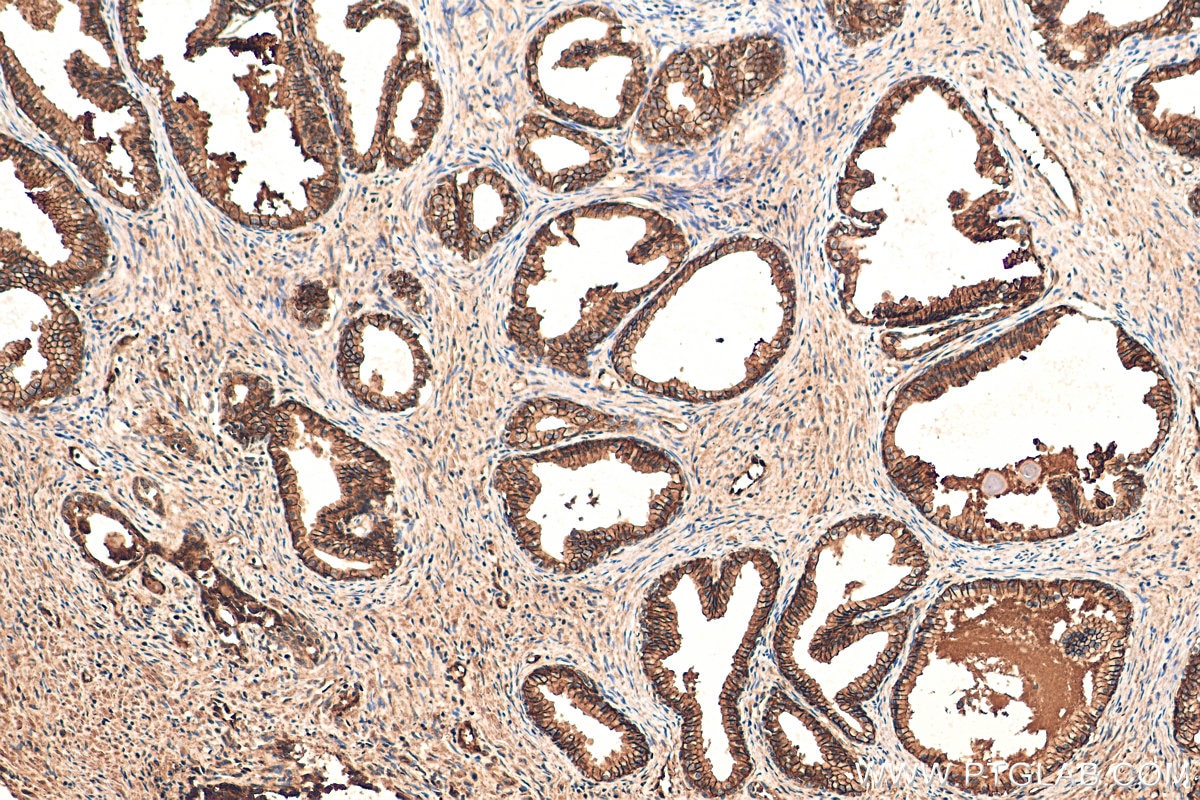AKR1C3 Polyklonaler Antikörper
AKR1C3 Polyklonal Antikörper für WB, IHC, IP, ELISA
Wirt / Isotyp
Kaninchen / IgG
Getestete Reaktivität
human und mehr (2)
Anwendung
WB, IHC, IP, ELISA
Konjugation
Unkonjugiert
Kat-Nr. : 11194-1-AP
Synonyme
Geprüfte Anwendungen
| Erfolgreiche Detektion in WB | A549-Zellen, HepG2-Zellen, Jurkat-Zellen, K-562-Zellen |
| Erfolgreiche IP | HepG2-Zellen |
| Erfolgreiche Detektion in IHC | humanes Prostatakarzinomgewebe Hinweis: Antigendemaskierung mit TE-Puffer pH 9,0 empfohlen. (*) Wahlweise kann die Antigendemaskierung auch mit Citratpuffer pH 6,0 erfolgen. |
Empfohlene Verdünnung
| Anwendung | Verdünnung |
|---|---|
| Western Blot (WB) | WB : 1:500-1:2000 |
| Immunpräzipitation (IP) | IP : 0.5-4.0 ug for 1.0-3.0 mg of total protein lysate |
| Immunhistochemie (IHC) | IHC : 1:50-1:500 |
| It is recommended that this reagent should be titrated in each testing system to obtain optimal results. | |
| Sample-dependent, check data in validation data gallery | |
Veröffentlichte Anwendungen
| WB | See 10 publications below |
| IHC | See 4 publications below |
Produktinformation
11194-1-AP bindet in WB, IHC, IP, ELISA AKR1C3 und zeigt Reaktivität mit human
| Getestete Reaktivität | human |
| In Publikationen genannte Reaktivität | human, Maus, Ratte |
| Wirt / Isotyp | Kaninchen / IgG |
| Klonalität | Polyklonal |
| Typ | Antikörper |
| Immunogen | AKR1C3 fusion protein Ag1674 |
| Vollständiger Name | aldo-keto reductase family 1, member C3 (3-alpha hydroxysteroid dehydrogenase, type II) |
| Berechnetes Molekulargewicht | 323 aa, 37 kDa |
| Beobachtetes Molekulargewicht | 34 kDa |
| GenBank-Zugangsnummer | BC019230 |
| Gene symbol | AKR1C3 |
| Gene ID (NCBI) | 8644 |
| Konjugation | Unkonjugiert |
| Form | Liquid |
| Reinigungsmethode | Antigen-Affinitätsreinigung |
| Lagerungspuffer | PBS with 0.02% sodium azide and 50% glycerol |
| Lagerungsbedingungen | Bei -20°C lagern. Nach dem Versand ein Jahr lang stabil Aliquotieren ist bei -20oC Lagerung nicht notwendig. 20ul Größen enthalten 0,1% BSA. |
Hintergrundinformationen
AKR1C3(Aldo-keto reductase family 1 member C3) is also named as DDH1, HSD17B5, KIAA0119, PGFS and belongs to AKR1C family. .In humans, at least four AKR1C isoforms exist: AKR1C1, AKR1C2, AKR1C3, AKR1C4 and AKR1C3 shares >86% sequence identity with these three highly related human AKRs(PMID:18574251). It catalyzes the conversion of aldehydes and ketones to alcohols and androgen, estrogen, PG, xenobiotics metabolism. The rat kidney possesses a dimeric form of 75 kDa(PMID:18574251).
Protokolle
| PRODUKTSPEZIFISCHE PROTOKOLLE | |
|---|---|
| WB protocol for AKR1C3 antibody 11194-1-AP | Protokoll herunterladen |
| IHC protocol for AKR1C3 antibody 11194-1-AP | Protokoll herunterladenl |
| IP protocol for AKR1C3 antibody 11194-1-AP | Protokoll herunterladen |
| STANDARD-PROTOKOLLE | |
|---|---|
| Klicken Sie hier, um unsere Standardprotokolle anzuzeigen |
Publikationen
| Species | Application | Title |
|---|---|---|
Mol Cancer Ther AKR1C3 promotes AR-V7 protein stabilization and confers resistance to AR-targeted therapies in advanced prostate cancer. | ||
World J Gastroenterol Prostaglandin F2α synthase promotes oxaliplatin resistance in colorectal cancer through prostaglandin F2α-dependent and F2α-independent mechanism | ||
Int J Mol Med 15-Deoxy-Δ(12,14)-prostaglandin J(2) induces growth inhibition, cell cycle arrest and apoptosis in human endometrial cancer cell lines. | ||
Neurosci Lett Mangiferin alleviates 6-OHDA-induced Parkinson's disease by inhibiting AKR1C3 to activate Wnt signaling pathway | ||
J Clin Med A New Histology-Based Prognostic Index for Aggressive T-Cell lymphoma: Preliminary Results of the "TCL Urayasu Classification" | ||
Transl Oncol AKR1C3 promotes progression and mediates therapeutic resistance by inducing epithelial-mesenchymal transition and angiogenesis in small cell lung cancer |





